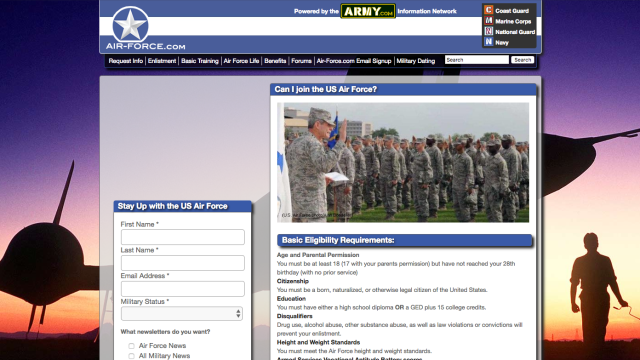Today, the Federal Trade Commission (FTC) announced it seized nine copycat websites set up to look like U.S. military recruitment pages. The websites, including Army.com and Air-Force.com, encouraged potential recruits to hand over their personal contact information. But that data was then sold to for-profit schools for their own recruitment.
The FTC filed a complaint in federal court today charging that two Alabama-based companies, Sun Key Publishing and Fanmail.com, made roughly $US11 ($15) million selling data to private schools. The companies would contact the potential recruits and encourage them to enroll at specific for-profit schools under the false impression that the U.S. military endorsed the organisations. If the mark sounded interested, Sun Key would sell that recruit’s information for anywhere between $US15 $US40. Tens of thousands of people visited the websites every month.
The defendants were charged with violating the FTC Act as well as the FTC’s Telemarketing Sales Rule and reached a settlement with the government. But they won’t have to give back that $US11 ($15) million because of their “inability to pay.”
Army.com had been owned privately since 1995 but the FTC alleges that private marketing companies only began using it for illicit purposes around 2010. FTC Chairman Joe Simon held a conference call with reporters about the actions earlier this afternoon and Gizmodo asked why, if websites like Army.com have been owned by third parties for so long, the government is only acting now.
“Law enforcement does take time and we had to work with the Department of Justice. We like to work as quickly as possible, but we do have due process. We think this is strong relief,” Simon said. “The fact that it was set up in 1995 is instructive. They weren’t just going to relinquish this website to the government.”
The FTC told Gizmodo that the list of schools involved in the scam is “nonpublic information” and could not be disclosed.
The website Army.com is no longer active, but the Wayback Machine does give a peek at what the site looked like as recently as February.
The other websites seized include:
-
armyenlist.com
-
navyenlist.com
-
marinesenlist.com
-
coastguardenlist.com
-
nationalguardenlist.com
-
airforceenlist.com
-
armyreserves.com
There was a small print notice on each site that explained how people would be contacted “about military and education information,” but according to the FTC, that was only added in 2013 and still didn’t make clear that the websites weren’t affiliated with the U.S. military.
The companies also bought internet ads that were deceptive, according to the FTC, describing the sites as official destinations for recruitment. It wasn’t until mid-2016 that the statement “a non-government, private sponsored website,” was added. To top it all off, the websites explicitly said that “personal information will not be shared with anyone else,” which obviously wasn’t true. A call to an attorney representing Sun Key Publishing was not returned by the time this story was published.
Government imposter scams are reportedly the number one complaint to the FTC, including phone scams like people pretending to be the water company and demanding payment. But these websites didn’t make money from potential recruits. They simply sold the information to third parties—schools that weren’t listed in the complaint by name.
“Those who are considering a military career deserve to have confidence that the recruitment site is legitimate and their personal information will not be misused,” said Simons. “The FTC will take action against any party in the lead generation ecosystem, from sellers to purchasers, that fails to comply with the law.”
Simon encouraged people who are actually interested in enlisting with the U.S. military to visit Defence.gov and to make sure that you check any government domain to make sure it has a .gov address. If you’re visiting a government website that has a .com address, it might be a scam.
[FTC]
